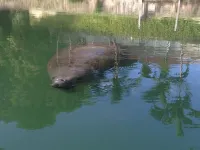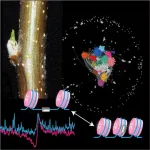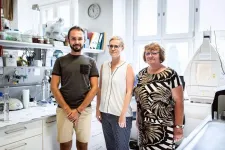Xingquan “Hill” Zhu, Ph.D., principal investigator and a professor in the FAU Department of Electrical Engineering and Computer Science, is spearheading the project in collaboration with FAU’s Harbor Branch Oceanographic Institute and Charles E. Schmidt College of Science, and Mote Marine Laboratory & Aquarium and Old Dominion University.
For the project, researchers will develop and employ generative AI to identify, track, and analyze behavior of marine animals (with a focus on manatees), and address traditional tracking cost-precision trade-offs. New tools can be applied to other marine species, and this work supports marine biodiversity, thus strengthening local economies relying on fishing and tourism.
Traditional tracking methods either require attaching transmitters to animals that communicate with radio receivers or satellites (high accuracy but expensive and invasive) or rely on manually produced sketches from photos of distinctive features such as scars (low accuracy and labor-intensive). The overarching goal of this project is to optimize this cost-precision trade-off by designing and delivering an AI-driven system for individual photo-identification and tracking in conservation studies of Florida manatees, a threatened species. The system aims to streamline the creation, maintenance, query, and behavior analysis of manatees using photo-identification software.
“Tracking marine animals at both individual and group levels is crucial for wildlife conservation. It provides essential information and invaluable insights into population dynamics, health, risks, and vulnerability, all of which help shape conservation policies, management decisions and strategies,” said Stella Batalama, Ph.D., dean, FAU College of Engineering and Computer Science. “We are incredibly grateful and excited to receive this vital support from the National Science Foundation and the Paul G. Allen Family Foundation, which will enable our outstanding research team to tackle the significant challenges in traditional tracking methods while balancing cost and precision.”
This research is one of 10 projects receiving funding under the Partnership to Advance Conservation Science and Practice program, a first-of-its-kind collaboration between the NSF and the Paul G. Allen Family Foundation. Now in its second year, the program is designed to catalyze deep collaboration between researchers advancing basic science and conservation partners engaging in on-the-ground conservation.
“The fundamental knowledge these projects create, even though related to specific species, will unlock innovative conservation efforts across a broader range of threatened species and ecosystems,” said Lara Littlefield, executive director for programs and partnerships at the Paul G. Allen Family Foundation. “For instance, studying whether mosquitos infected with bacteria can limit the spread of malaria among birds in Hawaii could ultimately limit disease spread among other animals more broadly.”
Each project extends basic science into on-the-ground conservation to address critical knowledge and data gaps, enabling greater real-world impact to benefit species and ecosystems.
“The unique partnerships this program creates forge a roadmap to broader conservation action by uniting the skills, expertise and tools needed to address the most urgent threats to our natural world,” said Susan Marqusee, NSF assistant director for biological sciences. “These projects also will engage the public, policymakers, law enforcement and others in conservation through education, outreach and other broader impacts.”
Project co-PIs are Sarah Milton, Ph.D., chair and professor, Department of Biological Sciences, FAU Charles E. Schmidt College of Science and Matt Ajemian, Ph.D., an associate research professor and director of the Fisheries Ecology and Conservation Lab at FAU Harbor Branch. The other two PIs from the collaborative organizations include Yi He, Ph.D., an assistant professor of computer science at Old Dominion University; and Catherine Walsh, Ph.D., senior scientist and program manager for the marine immunology program at Mote Marine Laboratory & Aquarium.
Zhu has an established track record in designing AI methods to solve domain application challenges. Recently, his team developed a new method to count manatee aggregations using low resolution images from surveillance videos. Milton’s research focuses on environmental physiology, particularly how stressors affect animal survival mechanisms. Her work on sea turtles includes studying hatchling energetics, climate change impacts on nesting and physiology, and developing treatments for turtles affected by toxic red tides. Ajemian’s expertise in ecology, ichthyology, and fisheries science spans topics such as habitat use, movement behavior and bycatch. He’s expertise is focused on building predictive models on sensory data streams, images, networks, and traffic movement forecasting. Walsh has more than 30 years of experience in manatee research, with a primary focus on ecology and conservation.
The project will train several graduate students and will advance collaboration between AI researchers and conservation scientists. Moreover, it will offer a lasting impact at different levels beyond its immediate action plan on Florida manatee conservation, stimulating a multi-disciplinary collaboration, tightening the bonds between researchers and students and between academia and local communities.
“Our tool, which we coined ‘EPICS,’ offers a novel lens to monitor marine ecosystems in real-time, allowing human intervention to be supplemented in a proactive manner to prevent biotic disasters,” said Zhu. “Together, FAU, Old Dominion University and Mote Marine Laboratory & Aquarium will advance and generalize AI-powered conservation study to manatees, sea turtles, whales, rays and other threatened or endangered marine species.”
Learn more about the Partnership to Advance Conservation Science and Practice program and view the full list of awards and awardees by visiting nsf.gov.
- FAU -
About FAU’s College of Engineering and Computer Science:
The FAU College of Engineering and Computer Science is internationally recognized for cutting-edge research and education in the areas of computer science and artificial intelligence (AI), computer engineering, electrical engineering, biomedical engineering, civil, environmental and geomatics engineering, mechanical engineering, and ocean engineering. Research conducted by the faculty and their teams expose students to technology innovations that push the current state-of-the art of the disciplines. The College research efforts are supported by the National Science Foundation (NSF), the National Institutes of Health (NIH), the Department of Defense (DOD), the Department of Transportation (DOT), the Department of Education (DOEd), the State of Florida, and industry. The FAU College of Engineering and Computer Science offers degrees with a modern twist that bear specializations in areas of national priority such as AI, cybersecurity, internet-of-things, transportation and supply chain management, and data science. New degree programs include Master of Science in AI (first in Florida), Master of Science and Bachelor in Data Science and Analytics, and the new Professional Master of Science and Ph.D. in computer science for working professionals. For more information about the College, please visit eng.fau.edu.
About U.S. National Science Foundation:
The U.S. National Science Foundation propels the nation forward by advancing fundamental research in all fields of science and engineering. NSF supports research and people by providing facilities, instruments and funding to support their ingenuity and sustain the U.S. as a global leader in research and innovation. With a Fiscal Year 2024 budget of $9.06 billion, NSF funds reach all 50 states through grants to nearly 2,000 colleges, universities and institutions. Each year, NSF receives more than 40,000 competitive proposals and makes about 11,000 new awards. Those awards include support for cooperative research with industry, Arctic and Antarctic research and operations, and U.S. participation in international scientific efforts.
About Paul G. Allen Family Foundation:
Founded in 1988 by philanthropists Jody Allen and the late Paul G. Allen, co-founder of Microsoft, the foundation works to enhance the arts and culture experience, mobilize young people to drive change, and advance science and technology solutions that address wildlife conservation, ocean health and climate change. The foundation also funds cutting-edge research in all areas of bioscience though the Paul G. Allen Frontiers Group.
About Florida Atlantic University:
Florida Atlantic University, established in 1961, officially opened its doors in 1964 as the fifth public university in Florida. Today, the University serves more than 30,000 undergraduate and graduate students across six campuses located along the southeast Florida coast. In recent years, the University has doubled its research expenditures and outpaced its peers in student achievement rates. Through the coexistence of access and excellence, FAU embodies an innovative model where traditional achievement gaps vanish. FAU is designated a Hispanic-serving institution, ranked as a top public university by U.S. News & World Report and a High Research Activity institution by the Carnegie Foundation for the Advancement of Teaching. For more information, visit www.fau.edu.
END





